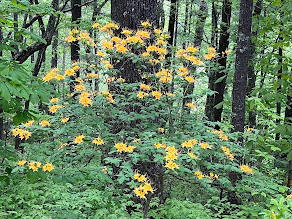Local resident makes a difference to protect wildlife

Media Contact: Cait Fallon, National Wildlife Federation, Phone 303-441-5167, FallonC@nwf.org
Cashiers, NC – July 12,2024 – The National Wildlife Federation (NWF), America’s largest wildlife conservation and education organization, is pleased that High Ridge Haven in Cashiers, NC has successfully created a Certified Wildlife Habitat® through its Garden for Wildlife™ movement.
NWF celebrates this effort to create a garden that supports birds, butterflies, bees, frogs and other local wildlife. Every Certified Wildlife Habitat garden provides natural sources of food, water, cover and places to raise young and is maintained in a sustainable way that incorporates native plants, conserves water and doesn’t rely on pesticides.

Started in 1973, the Garden for Wildlife movement is the nation’s oldest and largest native plant/habitat program, recognizing over 300,000 Certified Wildlife Habitat® gardens across North America and at 39 embassies worldwide, encompassing an estimated 4 million acres that support wildlife locally. Backyards, urban gardens, school grounds, businesses, places of worship, campuses, parks, farms, zoos, and community landscapes can all be recognized as wildlife habitats through the program. “We are excited about this new Certified Wildlife Habitat®, as it provides native plants and essential habitat elements. Research shows certified properties have the potential to support twice as much wildlife compared to non-certified properties.” Said, Mary Phillips, Head of Garden for Wildlife™/Certified Wildlife Habitat®.
“Anyone, anywhere can restore wildlife habitat right in their own yards and communities,” said NWF Naturalist David Mizejewski. “Whether you garden in a suburban yard, an urban area or a rural plot of land, you can make a difference for local wildlife. Creating a Certified Wildlife Habitat garden is fun, easy and makes a real difference for neighborhood wildlife. It’s the perfect grassroots way to think globally and act locally and help birds, butterflies, bees and other wildlife,” he added.
“While there has been an increasing trend to restrict short-term vacation rental properties (STRs) in many cities and towns, we’re demonstrating how responsible STR hosts can place resources back into its location rather than the prevailing thought as a drain on them. We are doing this by creating opportunities to immerse guests in nature, provide for education on being good stewards of sensitive habitats and endangered species, by planting native species and supporting biodiversity throughout the property. Supporting wildlife habitats, sustaining biodiversity and providing memorable vacation experiences are not mutually exclusive,” said Tim Spaid, High Ridge Haven owner.

“Our 10.5 acres set on a mountain ridge in the Western NC mountains is home to a temperate rainforest, receiving on average eighty-eight inches of rain annually, and hosts animal and plant species you will only find here. Rock circles dot our hiking trails to protect endangered Lady Slippers from being trampled, a rare form of orchid found here. We’ve transformed a septic drain field into a wildflower meadow whose blooms are supporting a thriving community of hummingbirds, bees and butterflies. Native azaleas, rhododendron and mountain laurel provide a floral backdrop blooming from spring through summer. The Turkey Trot Trail leads to the Turkey Den (so named for the wild turkey that roam the property), formerly an old water pump house has been converted into a kids’ nature education playhouse with nature observation deck. Off the deck is a commercial binocular stand for viewing the peregrine falcons that soar the thermals of Whiteside Mountain. The home has a library of books on local insects, animals, trees and plants, mushroom identification, hiking trails and even the practice of forest bathing. More expansive hiking trails are in the plans for High Ridge Haven with specimen plant and tree identification placards.”
High Ridge Haven has also committed support of the Homegrown National Park initiative principles to encourage native plant species to support our local ecosystem and the habitats that support and help our local ecosystem to thrive.
***
About National Wildlife Federation
The National Wildlife Federation is America's largest conservation organization, uniting all Americans to ensure wildlife thrive in a rapidly changing world. Follow us on Facebook, Twitter, and Instagram.
###

























Comments